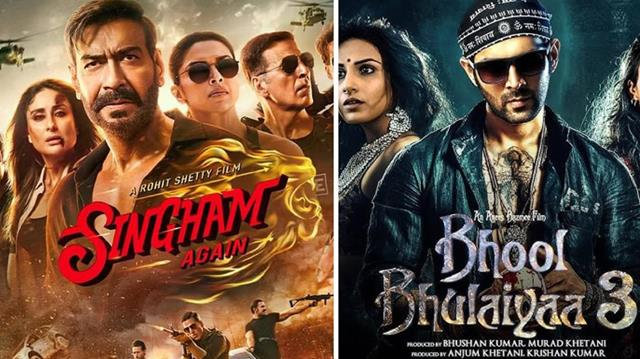The Diwali release season, traditionally marked by big Bollywood releases, has been met with some unexpected international challenges. Two eagerly anticipated films, Singham Again and Bhool Bhulaiyaa 3, have reportedly been “banned” in Saudi Arabia and delayed in Singapore, raising questions about the global standards of censorship and the limits of artistic expression.
‘Singham Again’ Faces Bans Over Religious Sensitivity
Directed by Rohit Shetty and starring Ajay Devgn, Singham Again was expected to perform spectacularly in the domestic and international markets, but its release faced a setback in Saudi Arabia due to its perceived portrayal of Hindu-Muslim tensions. The film, part of Shetty’s popular “cop universe,” has established itself with high-action sequences and has often incorporated themes of social justice.
However, according to sources, certain references made in the trailer have led the Saudi Arabian government to withhold the film’s release. Specifically, the trailer’s nods to the Ramayana and reimaginings of iconic characters stirred controversy.
These issues have prompted authorities in Saudi Arabia to ban Singham Again, aiming to prevent any cultural misunderstandings within their multicultural society. In recent years, Gulf countries have shown a tendency to restrict films that potentially portray religious conflicts, emphasizing the importance of maintaining religious harmony.
Read : Construction of World’s Largest Building ‘Mukaab’ Begins in Saudi Arabia
In Singapore, the movie’s release has also been postponed, although the cause is somewhat different. Reports suggest that Singapore’s censorship process delayed the movie due to incomplete censor checks, leading the producers to delay the release until November 7. This incident sheds light on how variations in censorship standards can impact a film’s rollout in global markets.
‘Bhool Bhulaiyaa 3’ and LGBTQ+ Representation
The third installment in the Bhool Bhulaiyaa series, a horror-comedy franchise directed by Anees Bazmee, has been widely anticipated for its unique blend of thrills and humor. Bhool Bhulaiyaa 3, starring Kartik Aaryan, also hit a roadblock in Saudi Arabia due to alleged “homosexuality references.”
Fans speculate that the characters portrayed by Vidya Balan and Madhuri Dixit may have a romantic storyline, a deviation from traditional norms for mainstream Bollywood cinema.
Read : Syria Resumes Saudi Flights After 12 Years of Suspension
This has sparked a conversation about LGBTQ+ representation in Indian cinema, as Saudi Arabia’s ban appears to be in line with their longstanding position on prohibiting portrayals of same-sex relationships in film.
In several Middle Eastern countries, films depicting LGBTQ+ themes often face censorship, impacting the narrative freedom filmmakers have when aiming to reach audiences in those regions.

In India, however, the portrayal of LGBTQ+ relationships in cinema has been gradually evolving. Films like Shubh Mangal Zyada Saavdhan and Ek Ladki Ko Dekha Toh Aisa Laga have opened doors for more diverse narratives, challenging stereotypes and reflecting changing social norms.
The ban on Bhool Bhulaiyaa 3 is seen by some as a setback, but also an opportunity for filmmakers to push boundaries and champion broader representation.
Cultural Impact and the Clash of Censorship
The divergent reactions to Singham Again and Bhool Bhulaiyaa 3 highlight a broader clash between international audiences’ demand for uncensored content and individual countries’ strict standards. Bollywood’s growing international footprint and the diaspora’s love for Indian cinema are testing the boundaries of censorship like never before.
Diwali releases typically draw large crowds, with Singham Again expected to lead in box office numbers over Bhool Bhulaiyaa 3 due to its wider screen availability in India.
Despite these bans, both movies are expected to perform well in the domestic market, with Singham Again projected to earn between ₹40-45 crore on opening weekend, while Bhool Bhulaiyaa 3 may reach ₹20-25 crore.
While the international restrictions will likely impact earnings in select markets, trade analysts believe these films will still draw substantial viewership, particularly from the Indian diaspora.
The tension between cultural representation and regulatory restrictions serves as a reminder of the challenges filmmakers face when creating content for global audiences.
As Bollywood expands its influence, the industry may increasingly grapple with similar issues, forcing both audiences and creators to consider the role of cinema in fostering cross-cultural understanding.

